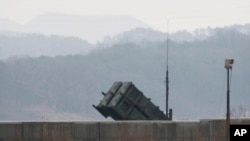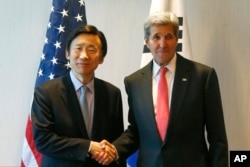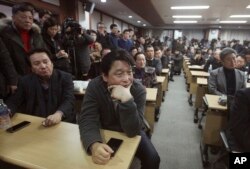The United States has temporarily deployed an additional Patriot missile battery in South Korea. The move was done in response to North Korea's nuclear test and long-range missile launch.
Commander of the U.S. Eighth Army Lt. Gen. Thomas Vandal said "exercises like this ensure we are always ready to defend against an attack from North Korea."
The temporary deployment came ahead of talks the U.S. and South Korea are set to hold in the coming week on deploying a more advanced missile defense system, a Seoul defense official confirmed.
THAAD missile system
Washington and Seoul formally announced last week they intend to deploy the Terminal High-Altitude Area Defense missile system, known as THAAD, in South Korea at the earliest possible date.
Exactly when and where the system will be deployed will be the subject of formal discussions to take place "as early as next week," according to a South Korean defense ministry official, who spoke anonymously Friday.
The official also stressed the THAAD deployment is only meant to protect South Korea from the north's growing nuclear and missile capabilities, and will not target other countries in the region.
U.S. officials have not commented on when the talks will take place.
China, Russia complaining
China and Russia have both complained about the possible deployment. In a statement Friday, Beijing's Foreign Minister Wang Yi expressed "serious concern," saying the system would "significantly undermine the strategic interest of China."
The U.S. and South Korea have long been reported to be considering the THAAD deployment. But the plan appears to have accelerated after North Korea launched a long-range rocket Sunday and placed what it described as an "Earth observation satellite" into orbit, just weeks after carrying out its fourth nuclear test.
In recent years, North Korea has repeatedly threatened to carry out nuclear attacks on the U.S., Seoul and Japan. With its latest tests, Pyongyang appears to be closing in on the capability to do so.
The U.S. and its allies have responded with calls to ramp up international sanctions against the north.
US, South Korea coordination
On Friday, U.S. Secretary of State John Kerry met with South Korean Foreign Minister Yun Byung-se on the sidelines of a security conference in Munich, Germany.
"The two ministers agreed to continue our close coordination towards a robust and united international response to the DPRK’s violations of multiple U.N. Security Council Resolutions that threaten international peace and security," said a U.S. statement.
Kerry "reaffirmed the U.S. ironclad commitment to the defense of the Republic of Korea and Japan and noted the vital importance of continued communication and cooperation among the three countries," the statement added.
Kerry met separately with Chinese Foreign Minister Wang. During the meeting, he "urged China to use their influence in Pyongyang to help the international community increase pressure" on North Korea, the State Department said.
The North's rocket launch and nuclear test also set off a new round of tensions between North and South Korea, which have remained in a technical state of war since their 1950s conflict.
Kaesong closing
This week, North Korea ordered all South Koreans to leave the jointly run Kaesong industrial complex that lies along the border and is one of the only areas of cooperation between the two countries.
Pyongyang said employees could only take personal belongings with them and ordered a "complete freeze" on the assets left behind. It said the expulsions were a reaction to Seoul's decision a day earlier to shut down its operations at the park.
South Korea on Friday warned the North that it acted "illegally" in freezing the South Korean assets and in forcing out the personnel. Meanwhile, the North said South Korea's actions amounted to "a declaration of war."
The North also declared the area a military zone, and said it was cutting off all military communications with Seoul, including the hotline at the border truce village of Panmunjom.







